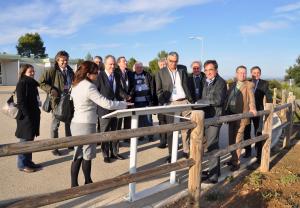Another step toward licensing
2 Dec 2011
-
Robert Arnoux
On a recent visit to ITER, members of the Groupe Permanent listen to Joëlle Elbez-Uzan's explanations. Also present were DDG Carlos Alejaldre; Nuclear Building Section Leader Laurent Patisson and Head of Communication Michel Claessens.
The long, complex and demanding procedure leading to the Autorisation de création—the final decree necessary for proceeding with the construction of the ITER nuclear installation—did not end with the conclusion of the Public Enquiry in August and the issuance of a Favourable Opinion by the Commissioners in September.
A parallel procedure—the Instruction technique (Technical Examination) of the ITER safety files by the French safety authorities—has been underway since the summer of 2010 and is now reaching an important milestone. Initiated by the French Nuclear Safety Agency (ASN), the Technical Examination was performed by the Institute of Radioprotection and Nuclear Safety (IRSN), acting as the ASN's technical expert. The examination was completed in September and its conclusions were summarized in a 300-page report.
"Whereas the Enquête Publique provided the general public with an opportunity to express its opinion on the project, the Technical Examination resulted in the submission of thirty questionnaires (some 800 questions all together) to the ITER Organization by the IRSN," explains Joëlle Elbez-Uzan, the head of the ITER Licensing Cell. Of course we had to answer each of these questions in detail."
The report and its recommendations are now in the hands of a group of some 30 experts appointed by ASN, the Groupe Permanent (GP). Members of the ITER Licencing Cell will further discuss the recommendations formulated by IRSN with the Groupe Permanent in the coming month.
A first round of "intense discussion" took place in Paris on Wednesday 30 November; a second meeting is scheduled on 7 December. Both are crucial, as they will determine the content of the final ASN report that, after a last stop at the Mission de Sûreté Nucléaire et de Radioprotection (MSNR), will open the way to the final green light from the French government: the Décret d'autorisation de création.
Compliqué? Probably. But no more than the ITER project itself, a one-of-a-kind venture and the first nuclear installation to observe the stringent requirements of the 2006 French law on Nuclear Transparency and Security.


